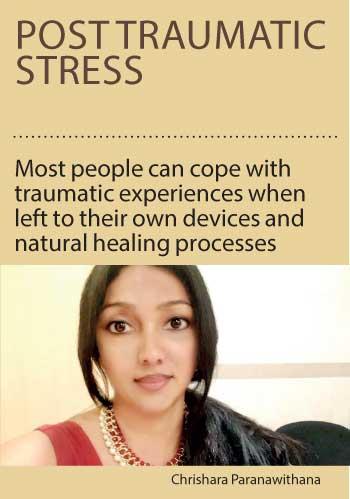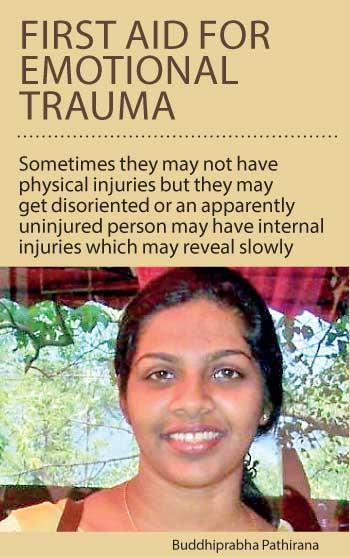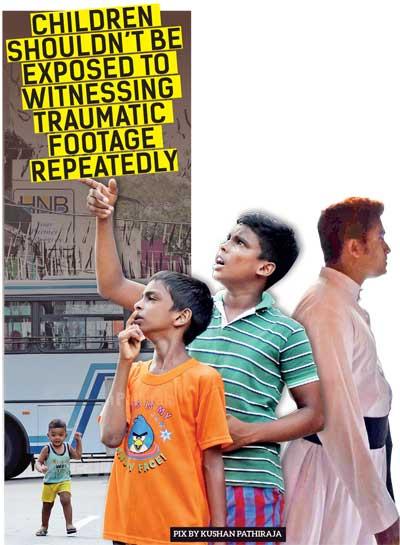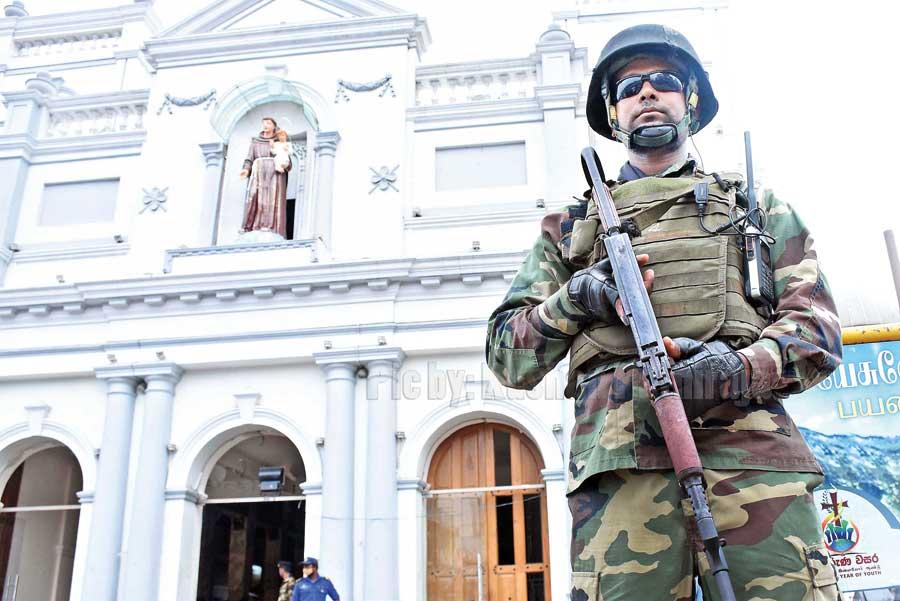When and How
The Easter Sunday attacks have been extremely traumatizing to one’s eye. As photos, videos and subject matter relating to these events continue to circulate on mainstream and social media, it may be difficult for certain people to grab everything at once. In fact it is never easy for one to get over a traumatizing event. In such instances people may not know how to react while also helping those around. When it comes to Sri Lanka, it is of utmost importance to focus on cultural factors when responding to a traumatic situation.
Hence the Daily Mirror, takes a closer look at how people should respond during such situations, priorities to keep in mind, coping strategies and when to seek
professional help.
Responding to Post traumatic stress 
As a country that suffered from a 30 year ethnic conflict, those immediately exposed to the crisis situation were definitely affected by PTSD. But back then, mental health was an alien subject and nobody wanted to open up about their psychological instabilities owing to various sorts of stigma and discrimination.
When mental health became a crucial part of one’s wellbeing, Sri Lankans started talking about it more openly. During a traumatic event, apart from depression and grief, Post Traumatic Stress Disorder (PTSD) may impact only a fewer percentage of the community. Usually, those affected will have some of the following key symptoms. These include ;
- Reliving the experience – this could be as nightmares, intrusive memories, flashbacks and physical reactions to any trigger that would remind one of the experience.
- Avoiding people, places or activities that bring the experience to mind. One could also experience a loss of interest in daily activities and experience feelings of emotional numbness and estrangement.
- Heightened arousal or vigilance – this could be indicated by irritability, angry outbursts and poor concentration.
Similarly acute stress disorder refers to a reaction that begins two days to a month after the traumatic event and would last for days or even weeks. Except for timing, its symptoms resemble PTSD with the addition of dissociation, partial amnesia, feeling as if you’re somewhere else, experiencing a slowing of time or a sense that the world is unreal.
In her comments, Licensed Clinical Psychologist and Visiting Fellow, Harvard University USA, Chrishara Paranawithana said that in clinical terms, it is always important to focus on the evidence base of evaluating therapy and certain therapeutic practices. “While trauma-focused cognitive behavioural therapy and Eye Movement Desensitization and Reprocessing (EMDR) have shown some promise, other approaches such as critical incident stress debriefing haven’t shown much evidence-based.
Psychological First Aid is a supportive factor. However, it is encouraging to note that most people can cope with traumatic experiences when left to their own devices and natural healing processes. Sri Lanka in fact is a collectivist country nourished by community healing. Ensuring the dignity, security with community support, extending love and basic care for the affected are key factors. In addition to that, media also plays a crucial role during mass traumatic events. Simply speaking, a loved ones uncovered dead body may create lasting trauma memories that can be prevented by ensuring and protecting a victim’s physical space. This could be done through community involvement, limited coverage and responsible reporting.”
"Simply speaking, a loved ones uncovered dead body may create lasting trauma memories that can be prevented by ensuring and protecting a victim’s physical space. This could be done through community involvement, limited coverage and responsible reporting"

She further said that an experimental approach to PTSD prevention is based on the well-known fact that extreme stress makes it difficult to eradicate memories. “This is because the brain changes its structure and neural networking.
Therefore, under the influence of stress hormones, the brain indelibly registers experiences so that we will know what to avoid in future. But in acute stress reactions, this natural survival mechanism can overshoot its mark, linking the memory and the intense emotion too tightly, pervasively and permanently. Anything that weakens the link might be a useful treatment.”
Dealing with secondary traumatisation
Paranawithana further said that secondary traumatisation may happen after being involved in rescue operations or being a witness to a traumatic event. “This could also happen when the event is witnessed via mainstream or social media. Therefore the media should focus on responsible reporting to avoid re-traumatisation. Furthermore, children shouldn’t be exposed to witnessing traumatic footage repeatedly.”
She also said that a person’s attitude towards post-traumatic mental health symptoms is also important. “This is why people should be told that their reactions are usually normal and that the symptoms may go away within two or three months. In most instances they need sympathetic listening, reassurance and comforting along with practical help. Reducing physical stress responses with exercise, breath training, adequate hours of sleep, yoga, mindfulness techniques or muscle relaxation techniques may help,” Paranawithana added.
"You need to show the person that you understand and care and ask them how they would like to be helped. Be on equal grounds and communicate rather than acting like an expert or a superior. Sometimes they may repeat the same thing and you will have to be ready for it"
Children in a post-trauma situation
Addressing the psychological problems of children exposed to such events, Buddhiprabha Pathirana, Developmental Psychologist and Head of Department of Psychology, Senior Lecturer in Psychology at University of Peradeniya said that “caregivers should maintain behaviour as predictable as possible and tell the child that you (and their loved ones) love and support them. Encourage the child to do things they enjoy doing, such as playing with toys, reading books or drawing art. You can help the child to feel in control by letting them make some decisions such as what to eat or wear.”
She further points out the following with temper tantrums and avoidance behaviours:
- Children may avoid things that remind them of the trauma.
- Figure out what triggers sudden fearfulness or regression.
- If the child has temper tantrums or becomes fearful, starts crying or is clingy, ask them what they are afraid of. Don’t get angry if they appear to regress by behaviours such as bed wetting, misbehaving or sucking their thumb.
- If the child avoids things that remind them of the trauma, but doesn’t appear very distressed, ask what they are afraid of and assure them that they are safe.
Pathirana further said that “symptoms associated with trauma may suddenly or unexpectedly appear months or years after the event. If this occurs, one may need to seek professional help”.
The Psychologists reference guidelines in responding to traumatic events :
According to First Aid for Emotional Trauma, a set of guidelines published by the Harvard Medical School and Traumatic events: first aid guidelines for assisting children, published by Mental Health First Aid Australia, people can differ in how they react to traumatic events. One may perceive it as deeply traumatic while the other may not. A history of trauma will make some people more susceptible to traumatic events that happen later on, while others may build resilience towards such events.
During a time of trauma, one has to keep the following in mind : Ensure your own safety – Before offering help to anyone check for potential dangers such as fire, weapons and other people who may become aggressive. Introduce yourself – Sometimes you may not know everyone around you. So it’s best to introduce yourself and explain your role. Always remain calm and do what you can to create a safe environment. Attend to injuries – If the person is injured see that his or her injuries are being attended to. If you can give first aid, then proceed or call for medical assistance.
Sometimes they may not have physical injuries but they may get disoriented or an apparently uninjured person may have internal injuries which may reveal slowly. Determine the person’s immediate needs – This could be food, water or shelter. Also keep in mind not to make any promises which are not doable. It may add to the person in distress.
“Always be aware of and responsive to the comfort and dignity of the person you are helping. Give the person truthful information and inform him about any available sources of information offered to survivors. These could be information sessions, fact sheets, phone numbers and the like,” Pathirana added.
Talking to someone after a traumatic event
One needs to be very cautious when talking to someone who has just experienced trauma. It is important to be genuinely caring than to say all the ‘right things’. You need to show the person that you understand and care and ask them how they would like to be helped. Be on equal grounds and communicate rather than acting like an expert or a superior. Sometimes they may repeat the same thing and you will have to be ready for it.
Withdrawal, irritability and bad temper may be a response to the trauma and one shouldn’t take it personally. It is important to be friendly even if the person is being difficult. One shouldn’t tell the other person how they should be feeling.
The survivor may repeatedly talk about what happened or they may not want to talk about it at all. In such instances one shouldn’t force them to tell their story. You should remember that you are not his or her therapist. Encourage the person to talk about their reactions if they are ready to do so. Avoid saying anything that may trivialize the person’s feelings. This may include comments such as don’t cry, calm down or comments such as ‘you should be glad you’re alive’.The person maybe experiencing survivor’s guilt so you need to be extra cautious when making such remarks.
Coping is another important part in this process. If you’re helping someone you know after a traumatic event, you can help them cope with their reactions over the next few weeks or months. Encourage the person to take care of themselves, get plenty of rest if they feel tired and do things that would make them feel good. It could be anything from reading to exercising or going outstation.
 When to seek professional help
When to seek professional help
Everyone may not need professional help to recover after a traumatic event. But if the person wants to seek help, you should support them to do so. She further said that if at any time the person becomes suicidal, one should seek professional help. One should also be alert about whether they abuse alcohol or other drugs to deal with the trauma. After four weeks, some return to normal functioning.
But if the following symptoms are seen after four weeks, you should recommend professional help; Feeling upset or fearful, unable to escape intense ongoing distressing feelings, withdrawal from family, loved ones and friends, experiencing nightmares because of or about the trauma, unable to enjoy life as a result of trauma Post-trauma symptoms interfering with their usual activities.
Furthermore the psychologists pointed out that a person should be encouraged to seek professional support if they feel dysfunctional soon after the event or if they have had a previous history of any psychopathology or a mental health condition.


 She further said that an experimental approach to PTSD prevention is based on the well-known fact that extreme stress makes it difficult to eradicate memories. “This is because the brain changes its structure and neural networking.
She further said that an experimental approach to PTSD prevention is based on the well-known fact that extreme stress makes it difficult to eradicate memories. “This is because the brain changes its structure and neural networking.
 When to seek professional help
When to seek professional help